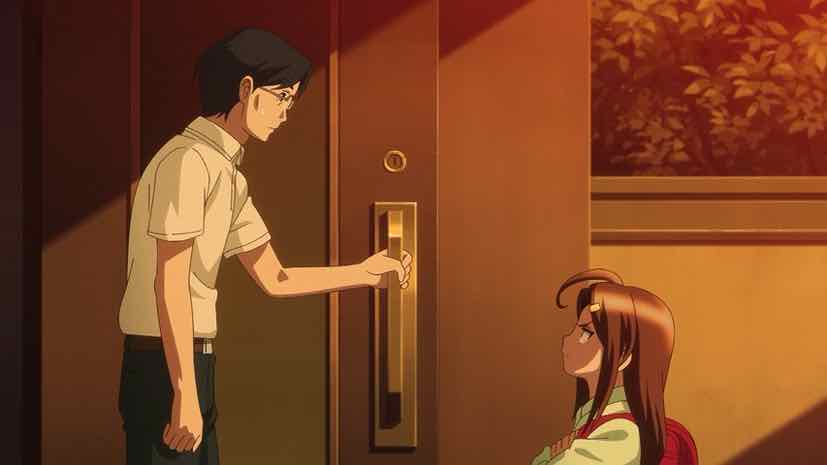If anime about adults is the overriding theme of this season (the question of whether this one qualifies is an interesting one), then big-time directors working on shows where you wouldn’t expect to see them is another. The director in question here is the superb Noriyuki Abe. And the series is Tsuma, Shougakusei ni Naru.. This is not as seemingly incongruous as Watanabe Ayumu and Kimi wa Meido Sama on some level. Abe is not quite of the same stature, and this show doesn’t appear to be quite as generic. But it’s still an interesting combination.
It’s hard to tell too much from this premiere even as a double episode (that really is a thing now). But to be sure, this series is one that has a better reputation that you (or me at least) might initially assume. A show about a grown man being married to a 10 year-old girl – which on some level is what Tsuma, Shougakusei is – has an inherent squick factor. And it could be off the charts, though the way it’s handled here discourages that. Nevertheless it’s not something that can be totally avoided, and I suppose it’s to the mangaka’s credit that they don’t try to.
The hook here is reincarnation of course – the man is not actually a lolicon. Niijima Keisuke is a nice but rather clueless salaryman who lucks into a marriage with the perfect woman (for him at least), Takae. They have a daughter named Mai, and we zip through many years of their lives together in the first episode. Takae is killed in an accident (no, not a trope at all) when Mai is in her teens, and the story flashes forward a decade. Both Keisuke and Mai are in a slow-motion talespin – listless and directionless, eating combini dinners in silence. And Mai doesn’t have a job.
And so as one reincarnation adaptation ends (for now), another begins. Takae returns in the body of a 10(ish)-year old girl. She says she only started regaining her memories of her former life, triggered by having walked past her old house. But she certainly seems to remember everything now. And she totally inhabits the persona of her former self, to the point where there’s no obvious trace of the child left. This is complicated for any number of reasons, not least that Keisuke could easily get himself branded as a predator for expressing his feelings openly (much less physically). And Takae has a new life with expectations she’s expected to fulfill (which I’m assuming require a lot of acting from her at this point).
There’s another complicating factor here. One of Keisuke’s co-workers (possibly a subordinate, which carries its own set of problems) is obviously interested in him and suggests they become “bento buddies’. Obvious to everyone but him that is (I did say he was clueless). Takae spots the problem immediately, but this raises the interesting question of whether she expects (or wants) him to get on with his life in that sense. She’s already expressed her irritation that her family hasn’t moved on – but how far does she carry that, especially now that she’s back in contact with them?
The flip side of that is also on the table of course. In Takae’s “real” life – as a grade-schooler named Shiraishi Marika – she has a friend named Takeru who’s seemingly interested in her. These are children so obviously the implications are different, but it does place a certain set of responsibilities on “Marika’s” shoulders. As an adult who appears to them to be another child, she has a responsibility to interact – and not interact – with them in certain ways. It can be straightforward, as when she uses her experience to mediate a petty name-calling dispute. But as with so much of this scenario it has the potential to get really complicated really quickly.
Marika has a family too – specifically a divorced mom who seems set up to be the story’s bogeyman. She’s neglectful and verbally abusive at the very least (with suggestions it’s more). But she expects her daughter to be a little girl – to be where she’s supposed to be when she’s supposed to be. Marika’s other life as Takae inevitably leads to trouble, as her unexplained absences have her mother very suspicious. In a reincarnation story with these circumstances, practical logistics are going to be a huge challenge – and it’s nice to see a story doesn’t gloss over that.
So what’s the sum total of all this? A story with potential, certainly. So far Tsuma, Shougakusei ni Naru plays as a sort of nuts & bolts “what if” premise, which is an interesting take on the reincarnation theme. It’s a path full of obvious land mines, but the writing here might be good enough to avoid most of them. If it can there are some interesting ideas to explore here. The show is obviously made on the cheap but Abe is a deft directorial hand, and keeps things flowing pretty effortlessly. It’s also interesting hearing the extremely versatile Aoi Yuuki as Takae/Marika, which is a different sort of role than we’re used to seeing with her. It’s a crowded season but this show has a chance to be in the mix somewhere.
The post First (and Second) Impressions – Tsuma, Shougakusei ni Naru. (If My Wife Becomes an Elementary School Student) appeared first on Lost in Anime.



